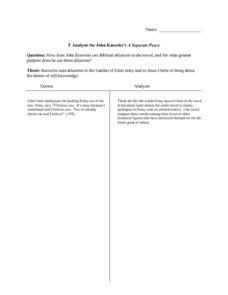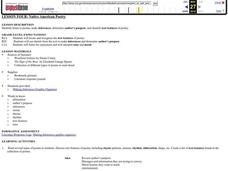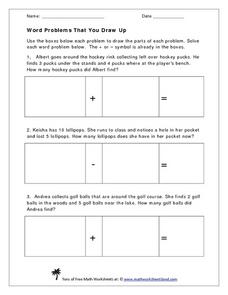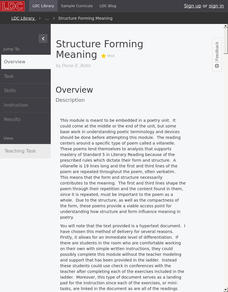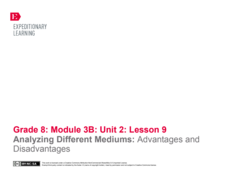EngageNY
Organizing an Opinion, Reasons, and Evidence: Text 1 for Each Expert Group
Working in small groups, scholars continue reading an informational text about either Roberto Clemente or Althea Gibson. As they read, pupils create graphic organizers in their journals to help map their ideas logically.
EngageNY
Organizing an Opinion, Reasons, and Evidence: Expert Group Text 3
Let's race to the finish line. Scholars read an informational text about a chosen athlete. While reading, they add evidence and reasons to a graphic organizer to support their opinions about how their athlete broke barriers.
EngageNY
Conducting Research: Analyzing Expert Texts about the Mary River Project
Pupils read informational texts about the Mary River Project, searching for the gist. As they read the expert texts, they complete a graphic organizer to identify and analyze point of view.
Curated OER
Word Problem Solving Strategies Cookies 2
This is a fantastic template to guide scholars in solving math word problems! Students read a word problem dealing with sales and profits, and fill in a graphic organizer to guide the process. They consider important information, the...
Curated OER
A Separate Peace - T Analysis
Reading A Separate Peace? Readers analyze important quotes that appear in John Knowle's classic novel using the provided graphic organizer. Learners record a passage and provide an accompanying analysis for each entry. Consider having...
Biology Junction
Cells and Their Organelles
This series of handouts and images asks young scientists to read short informational paragraphs, answer identification questions, and color and label diagrams of animal and plant cells. This is a complete resource that could be given as...
Curated OER
Native American Poetry
Identify text features, make inferences, and discover the cultural significance of Native American Poetry. Sixth graders read several Native American poems and use graphic organizers and literature response logs to record their feelings...
Curated OER
Word Problems That You Draw Up
What a great way to practice word problems! Scholars already familiar with addition and subtraction can take the next step with this graphic organizer, including three word problems they write out numerically. After reading each...
Curated OER
The Adventures of Tom Sawyer: Finding the Main Idea
After reading chapter 17 of The Adventures of Tom Sawyer, give this graphic organizer to your kids to find the main idea. The circles are small and will probably spark complaints, but the main idea should never be lengthy; it should be...
Curated OER
Characterization Worksheet
Use any story with this characterization worksheet! On the first page is a graphic organizer that encourages the reader to look for examples of direct characterization. On page two, read about direct and indirect characterizations,...
Curated OER
Mapa de la historia
Is your advanced Spanish class reading Spanish literature? Give them this graphic organizer to help them sift through the story. Where does it take place? When? What happens in the story?
EngageNY
Learning About Farms in Colonial America: Explicit vs. Inferred Information
Aid your pupils in understanding the terms explicit and inferred while teaching them about colonial farmers. The third activity in the module builds off the previous activity and focuses heavily on inference. Learners analyze a...
Teacherfiles
Cause and Effect
Review the importance of cause and effect with a straightforward language arts worksheet. While reading a short story or novel, kids record three causes and their effects in a graphic organizer.
Ed Helper Clip Art
Main Idea Mountain
After reading a text, learners fill out a graphic organizer in the shape of a mountain, with the main idea as the peak.
Literacy Volunteers of Greater Hartford
How to Write a Cover Letter
What are the key components of an effective cover letter? Using the resource, scholars read about the importance of sending an introductory letter to prospective employers. Next, they complete graphic organizers detailing what...
Arizona State University
Declaration of Independence: A Transcription
The Declaration of Independence may seem like an outdated document, but it exists as one of the most important to the United States government. Middle and high schoolers read the declaration, complete a graphic organizer, and take notes...
EngageNY
Grade 10 ELA Module 2: Unit 1, Lesson 17
Scholars read the final paragraphs written by Martin Luther King Jr. in "Letter from Birmingham Jail." Readers work in groups to discuss King's word choice and point of view by completing graphic organizers. They also respond to a...
Literacy Design Collaborative
In Pursuit of Happiness
What ideas and philosophies guided the Transcendentalist movement in America? Scholars explore the topic, reading texts by Ralph Waldo Emerson and Henry David Thoreau. Additionally, they write essays comparing the authors' structural...
Literacy Design Collaborative
Structure Forming Meaning
Teach literary lovers how to form opinions about form. Scholars read
informational text about the form used in villanelles. After analyzing
the structure used in the poetry with graphic organizers and gallery
walks, writers create...
EngageNY
Development of the Plot: Impending Danger and Turmoil
Danger! Scholars look closely at two poems, 'TV News' and 'Closed Too Soon.' While reading, learners think about Ha's country's increasing dangers and conflict. They record their thoughts in graphic organizers and discuss what details...
EngageNY
Analyzing the Model Essay: Studying Argument (Chapter 27 Plus Synthesis of Scenes in Previous Chapters)
Scholars partner up to review a model essay and talk through the process leading up to writing their essays. During a second reading of the essay, learners locate and underline the claim given, reasons, and counterclaim. They then...
EngageNY
Building Background Knowledge: The Internment of Japanese-Americans during WWII, Part 1
It is all in the details. Scholars read The Life of Miné Okubo and pay special attention to details that reveal Okubo's character. Completing their Understanding Miné: Character Traits graphic organizers and recalling the descriptions...
EngageNY
Analyzing Different Mediums: Advantages and Disadvantages
How do authors play to people's moods? After briefly reviewing mood using a Conditional and Subjunctive Mood handout, learners practice identifying conditional and subjunctive sentences in the Montgomery Bus Boycott speech before reading...
EngageNY
Speech Structure: Unions as Agents of Change— Part 2
Scholars continue reading César Chávez's 1984 speech, "Address to the Commonwealth Club of California." Working with partners, they complete graphic organizers to determine a claim that Chávez makes about the UFW.






